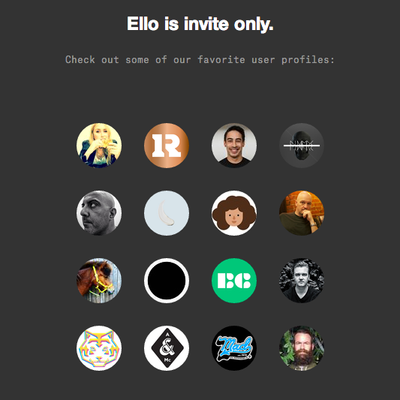
The internet hive mind is good at a lot of things. Telling the future is not necessarily one of them. Late last week, the new social network Ello reached a tipping point, moving from a weird, unfamiliar term you saw popping up on people’s Twitter feeds to the cause of a full-blown FOMO outbreak, with desperate would-be users even attempting to buy entrée into the invite-only site. A self-reported 3,000 to 4,000 new users were signing on per hour, an overload that caused Ello, still in beta, to suspend invitations while it played catch-up to demand. The network had burst fully, virally to life. Then, in the space of, oh, a day or two, it was declared seriously ill. Fruit flies have been allowed more time to come into their own.
So what, exactly, is Ello? The creators positioned it, explicitly, as the “anti-Facebook.” They shared a high-minded manifesto (and actually called it a manifesto), in which they explained their belief that “a social network can be a tool for empowerment. Not a tool to deceive, coerce, and manipulate — but a place to connect, create, and celebrate life.” Ello, unlike the social network that shall not be named, would never have ads, it would never sell your data, it wouldn’t even make you use your real name. It would, in its enlightened state, respect your privacy. As if on cue, Ello got a nice lift when it became an alternative for those eager to ditch Facebook after the latter had deep-sixed the accounts of drag artists who’d tried to use pseudonyms rather than their real names. Here, finally, was the humane counter to the Facebook Borg.
It didn’t seem to matter that the actual uses of Ello were less intuitive and easy to parse than its anti-marketing, pro-privacy positioning. After signing up, you can designate other users as friends, and their images or text appears in your feed. Designate them as “noise” and their posts show up in a separate feed. The layout is spacious and clean, with lots of white space. It seems better suited for images than text. The whole thing scans like a prettier, more schizophrenic and personally curated Tumblr feed. There are, of course, no ads. The vibe is less evocative of an impassioned revolutionary meeting place than it is, say, a Scandinavian espresso bar with a delightfully robust community corkboard. But aside from the privacy and the ideological eff-you to Facebook, it’s hard to see what Ello can do for you that other social networks — where your friends are already hanging out — can’t.
Ello utopianism lasted about a day. Ello’s stance was hypocritical. (Founder Paul Budnitz created an account for his bicycle company.) Ello’s privacy controls were insufficient. (It did not, at least initially, allow users to block unwanted or abusive followers.) Ello was a sell-out. (VC firm FreshTracks Capital had given $435,000 in seed money.) Companies like Sonos and Netflix quickly created Ello accounts. There went the neighborhood.
Who’s right, the yeas or nays? Obviously, no one knows. Twitter used to be the thing where narcissists shared what they had for breakfast. Then Instagram took that role, and Twitter became a breaking-news wire. Before Facebook was Facebook, it was a Hot or Not for Harvard kids. There’s no way the Defense Department geeks fiddling with ARPANET had any inkling that their creation would reshape how we communicate with each other, let alone the vastness of our desire for cute sloth videos. These things, Ello included, take on lives — and deaths — of their own.
The real lesson of Ello, then, is a lesson in public posturing. People want to be on Ello so they can have an opinion about Ello. And on the off-chance that Ello is the next big social network, best to put down a stake early. It’s the need to perform a stance, pro or con, which compelled the attention. It’s the same impulse that, for example, drove millions of people who very likely did not have a particular prior interest in coprophagic porn to check out 2 Girls, 1 Cup—content matters less as content than as an occasion to expound. (And God forbid you find yourself in the shameful position of not knowing about something.) Same goes, so far, anyway, for Ello. We came, we saw, we chattered. But social networks must grow rapidly or die, and unless Ello can find a way to convert this burst of attention into something that Facebook isn’t already supplying, soon we’ll move on. After all, there’s something coming, just over the horizon, and we are going to have to talk about it.





























